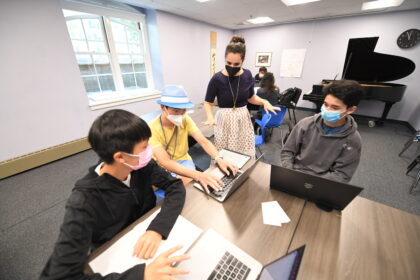the ethi{CS} project
the ethi{CS} project team
Kiran Bhardwaj, Instructor in Philosophy and Religious Studies
Michelle Ciccone, Tang Institute Research Affiliate
Steve Russell, Instructor in Mathematics, Statistics, and Computer Science
Nick Zufelt, Instructor in Mathematics, Statistics, and Computer Science
What is the ethi{CS} project?
Software developers and others who create or deploy technologies make choices that have a profound impact on all of us. Therefore, it is essential that computer science and other technology education should require that students studying CS not only learn how to code, but also learn to determine whether the choices they make while coding are ethically well-grounded.
The ethi{CS} project is a Tang Institute-incubated program that works to give computer science and technology teachers the support and resources to teach students to be engaged ethically in their technical learning.
the ethi{CS} project materials & resources
How to Respond...
Controversial issues around privacy make for engaging and unpredictable classroom conversation. But, in the midst of these classroom conversations, inevitably comes that comment:
“Well, I don’t really care anyway. I’m not doing anything wrong so I have nothing to hide.”
So how might an educator respond when a student says they don’t care about privacy? Michelle Ciccone, Tang Institute Research Affiliate, takes us through our options.
Pedagogy Technique: Argument Repair
One technique from ethics classes that is underutilized in the technology classroom is argument repair: the practice of trying to "build better ethical arguments". How do you start this type of conversation in your classroom and get your students to be active participants? Tang Fellow Kiran Bhardwaj explains.
Explainer: The Ethics of Data Privacy
Users and creators of technical tools face competing data privacy priorities between convenience and security. We want the added convenience of being able to have easy access to our private information and to share that access with those we choose. Yet there are those we don't want to have our private information, or those who simply don't need it. How should we resolve this tension?
Book Reviews
Technically Wrong
Kiran Bhardwaj and Nicholas Zufelt offer a book review of Sara Wachter-Boettcher’s Technically Wrong, and share ways this book could be used to complement CS projects or assignments that prompt ethical thinking.
Data Feminism
In this book review of Data Feminism, written by Catherine D’Ignazio and Lauren Klein, Nicholas Zufelt offers concrete strategies for how this book, or excerpts from it, can be connected to any number of moments in computer science or related classrooms
Interested in joining the ethi{CS} community?
Are you an educator in computer science or another related domain who is interested in sharing ideas, resources and approaches to embed ethics into your curriculum? We'd love to have you join our growing community; please reach out to us at [email protected].


